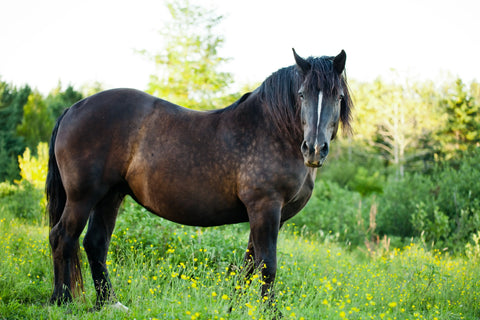
Rider Weight: A Key Factor in Your Horse’s Well-Being
of reading - words
Horse riding is an exciting discipline that unites humans and horses in harmony of movement and communication. However, to maintain this relationship healthy and beneficial for both parties, it is crucial to take into account an often underestimated factor: the weight of the rider in relation to that of the horse.
This aspect can have a significant impact on the horse's health and performance, as well as the riding experience itself. In this article, we'll explore why the rider's weight is so important, how to determine if the weight is appropriate, and the potential consequences of an imbalance between the rider's weight and that of their horse.
Why is Rider Weight Important?
The horse, despite its great strength and apparent robustness, is an animal whose spine and muscles can easily be overexerted. The weight a horse carries, when ridden, rests primarily on its back. If this weight is too high, it can cause pain, injuries, and even long-term musculoskeletal disorders.
Excessive load on the horse's back can lead to:
-
Back pain: Constant and excessive pressure on the horse's spine can cause acute or chronic back pain, reducing comfort and physical abilities.
-
Muscle Imbalances: The horse's back and shoulder muscles are under particular stress when the rider's weight is too high, which can lead to muscular imbalances and compensations that affect the horse's gait and performance.
-
Premature joint wear: Excessive weight can accelerate joint wear, especially in the limbs, leading to joint problems such as osteoarthritis.
How to Evaluate if the Weight of the Rider is Appropriate?
The often cited general rule is that the total weight of the rider, including equipment (saddle, bridle, etc.), should not exceed 15 to 20% of the horse's weight. This rule helps limit stress on the horse's back while ensuring that it can move freely and comfortably.
- Practical example: For a horse weighing 500 kg, the rider and his equipment should ideally weigh between 75 and 100 kg. Beyond this range, the risk of discomfort and injury to the horse increases.
However, this rule is not absolute and other factors must be taken into account:
-
The physical condition of the horse: A muscular and healthy horse will be able to carry more weight than a horse that is overweight or has health problems.
-
The horse's training level: A well-trained horse used to carrying riders can tolerate a little more weight than a beginner horse.
-
Equestrian discipline: Certain disciplines, such as dressage or leisure riding, allow a little more flexibility, while show jumping or endurance require a lighter weight to preserve the horse's joints and muscles.
The Consequences of a Weight/Balance Imbalance
A rider whose weight exceeds the capabilities of his horse exposes the latter to various health risks, but also to psychological and behavioral consequences. A horse that suffers from chronic pain may become reluctant to be ridden, develop defensive or aggressive behaviors, or even lose motivation to work. In addition, these pains can have an impact on the quality of their movement, making riding sessions less fluid and pleasant.
To avoid these problems, it is essential for each rider to honestly assess their own weight in relation to that of their horse, and to take the necessary measures to protect their health. This may include weight loss for the rider, the choice of a larger or stronger horse, or the use of weight management techniques such as walking or lunging to vary the horse's activities and reduce the load on its back.
Conclusion
The weight of the rider is a determining factor for the well-being and performance of the horse. Respecting the recommended limit of 15 to 20% of the horse weight, taking into account the horse's physical condition and training, and being aware of signals of distress or discomfort, you can ensure a healthy and harmonious riding experience. By taking care of your horse, you not only guarantee its health, but also the sustainability of your equestrian partnership.










